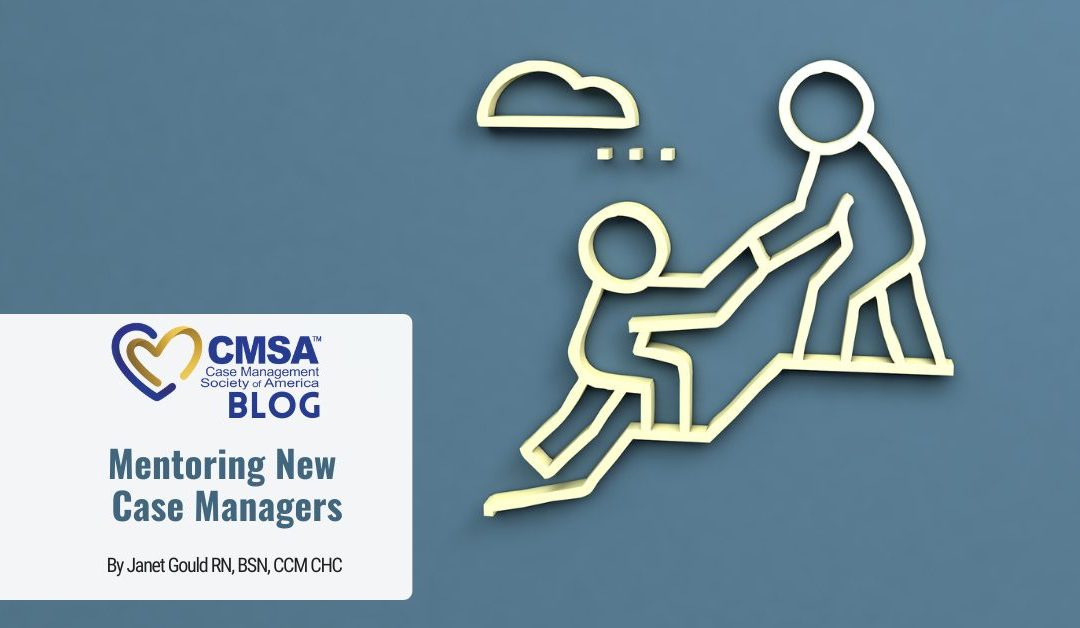By Janet Gould, RN, BSN, CCM CHC
Hiring a new case manager is exciting, yet only the beginning! The real work begins once that new hire is on board. Is your organization ready to train and guide the case manager to thrive and shine? That’s the real question. One would expect after going through the effort to bring the next awesome case manager on board, they would have an amazing onboarding process. Why doesn’t that always happen? I wonder, too!
An employer that is truly focused on employee retention and engagement, has put time and effort into building a training platform that is robust with learning opportunities. Having a process and plan for training a case manager is critical. A successful component of that learning process is offering mentorship as one of the tools in the case management toolbox. Mentoring walks alongside a case manager as they are learning and sustains them with ongoing support and learning opportunities. Without it, employees can feel lost, unsupported, and may hand in their resignation sooner than you thought possible.
Case managers need to master the type of case management practice they’re providing – onsite; telephonic; hospital or rehabilitation; independent case management or insurance company-based, to name just a few. Even an experienced case manager needs to learn the ins and outs if they change their field of practice.
The next layer is learning the resources and support systems (i.e., vendors, providers, ancillary companies). One must learn how to network, build professional relationships, and provide accurate and relevant information to their patients or customers while listening and communicating clearly and effectively.
The art of training is how all that knowledge is passed along from current case managers to a newbie. Mentorship is powerful for the mentoring staff as well. It allows current staff to share in the enthusiasm and excitement of the new hire and realize ALL the information and skills they have accumulated themselves, sharing that knowledge with the new case manager is downright fun and invigorating. That’s powerful!
How a training program is built and sustained is truly up to the organization. It also sets an employer apart, creating a culture and atmosphere in which employees don’t want to leave. Which is the goal, right?
A few key steps for training success:
Step 1: The Right Hire: Is the employee ready to learn and engage in the process? This is critical step #1!
Step 2: The Right Mentor: Is the mentor enthusiastic, and ready to train and work with a new case manager?
Step 3: Training Program: Is there a robust mentorship program as part of the new hire training? Has the organization put the time and effort into building this? It isn’t just teaching the basic needs of the position but it’s showing the new hire about the organization and skills needed for their position. Does management (to the top), embrace and support this partnership? If not, it may not be successful.
Step 4: Team Support: Support from the whole team, not just the mentor. Are others willing to answer questions and give input? Are employees engaged? Is there a positive culture new hires feel and experience with those they interact with within the organization?
Step 5: Ongoing Training: Long after a new hire has completed their ‘onboarding’, there are ongoing training needs for ALL members of an organization. There are always new things to learn or challenges to master. This requires an ongoing training platform.
Case management is not ‘just a job’ but a lifelong profession that has a profound impact on those we serve every day. For me, it’s definitely not ‘just a job’— it’s my passion. Let’s do our part to help some awesome new case managers join our special practice. Then, let’s keep them engaged and enthusiastic with our ongoing training efforts. When used the right way, mentorship is one of the most powerful tools in our toolbox.
“Treat employees like they make a difference and they will.” - Jim Goodnight
Get ready for a groundbreaking experience at the CMSA Boot Camp! WHEN: March 8-10, 2024 - WHERE: Nashville, TN - Explore ethical practices, healthcare reimbursement, versatile skill sets, communication techniques, and more over two and a half days of in-person instruction. Register Now to Elevate Your Case Management Skills: ![]() https://cmsapmg.wpenginepowered.com/cmsa-boot-camp/
https://cmsapmg.wpenginepowered.com/cmsa-boot-camp/
Bio: Janet Gould is a registered nurse with more than 30 years of clinical case management experience in workers’ compensation. Throughout her career, she has been responsible for recruiting, managing and leading case management teams in delivering compassionate, positive outcome-driven and cost-effective care. As a Director of Case Management at ForzaCare, that responsibility continues supporting employees, employers, insurance companies and medical providers. Janet holds Certified Case Manager (CCM) and Certified Health Coach (CHC) designations. Janet remains active in several organizations, including the Case Management Society of America (CMSA).

